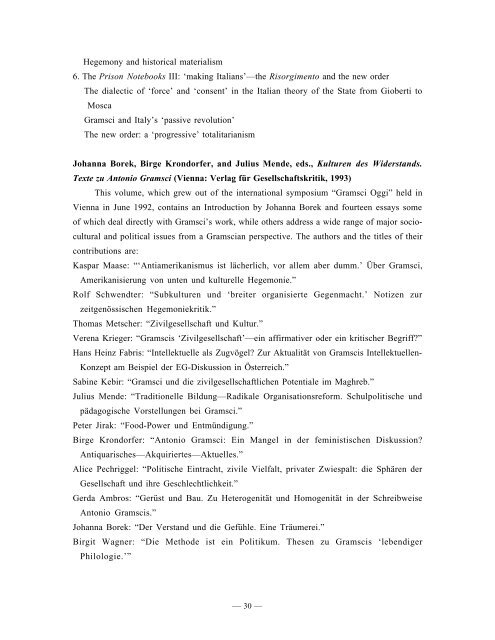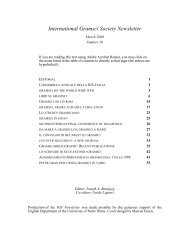Newsletter - International Gramsci Society
Newsletter - International Gramsci Society
Newsletter - International Gramsci Society
Create successful ePaper yourself
Turn your PDF publications into a flip-book with our unique Google optimized e-Paper software.
Hegemony and historical materialism<br />
6. The Prison Notebooks III: ‘making Italians’—the Risorgimento and the new order<br />
The dialectic of ‘force’ and ‘consent’ in the Italian theory of the State from Gioberti to<br />
Mosca<br />
<strong>Gramsci</strong> and Italy’s ‘passive revolution’<br />
The new order: a ‘progressive’ totalitarianism<br />
Johanna Borek, Birge Krondorfer, and Julius Mende, eds., Kulturen des Widerstands.<br />
Texte zu Antonio <strong>Gramsci</strong> (Vienna: Verlag für Gesellschaftskritik, 1993)<br />
This volume, which grew out of the international symposium “<strong>Gramsci</strong> Oggi” held in<br />
Vienna in June 1992, contains an Introduction by Johanna Borek and fourteen essays some<br />
of which deal directly with <strong>Gramsci</strong>’s work, while others address a wide range of major sociocultural<br />
and political issues from a <strong>Gramsci</strong>an perspective. The authors and the titles of their<br />
contributions are:<br />
Kaspar Maase: “‘Antiamerikanismus ist lächerlich, vor allem aber dumm.’ Über <strong>Gramsci</strong>,<br />
Amerikanisierung von unten und kulturelle Hegemonie.”<br />
Rolf Schwendter: “Subkulturen und ‘breiter organisierte Gegenmacht.’ Notizen zur<br />
zeitgenössischen Hegemoniekritik.”<br />
Thomas Metscher: “Zivilgesellschaft und Kultur.”<br />
Verena Krieger: “<strong>Gramsci</strong>s ‘Zivilgesellschaft’—ein affirmativer oder ein kritischer Begriff?”<br />
Hans Heinz Fabris: “Intellektuelle als Zugvögel? Zur Aktualität von <strong>Gramsci</strong>s Intellektuellen-<br />
Konzept am Beispiel der EG-Diskussion in Österreich.”<br />
Sabine Kebir: “<strong>Gramsci</strong> und die zivilgesellschaftlichen Potentiale im Maghreb.”<br />
Julius Mende: “Traditionelle Bildung—Radikale Organisationsreform. Schulpolitische und<br />
pädagogische Vorstellungen bei <strong>Gramsci</strong>.”<br />
Peter Jirak: “Food-Power und Entmündigung.”<br />
Birge Krondorfer: “Antonio <strong>Gramsci</strong>: Ein Mangel in der feministischen Diskussion?<br />
Antiquarisches—Akquiriertes—Aktuelles.”<br />
Alice Pechriggel: “Politische Eintracht, zivile Vielfalt, privater Zwiespalt: die Sphären der<br />
Gesellschaft und ihre Geschlechtlichkeit.”<br />
Gerda Ambros: “Gerüst und Bau. Zu Heterogenität und Homogenität in der Schreibweise<br />
Antonio <strong>Gramsci</strong>s.”<br />
Johanna Borek: “Der Verstand und die Gefühle. Eine Träumerei.”<br />
Birgit Wagner: “Die Methode ist ein Politikum. Thesen zu <strong>Gramsci</strong>s ‘lebendiger<br />
Philologie.’”<br />
— 30 —



